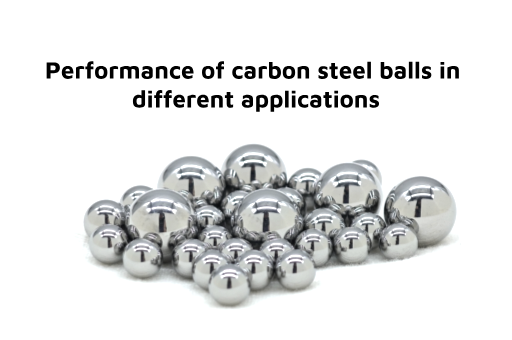
 Home > News
Home > NewsIntroduction
Carbon steel balls are essential components in a variety of industrial and consumer applications. Their performance, characterized by attributes such as hardness, wear resistance, and cost-effectiveness, makes them suitable for a broad spectrum of uses. This article explores the performance of carbon steel balls across different applications, highlighting their advantages, limitations, and typical use cases.

Carbon steel is an alloy of iron and carbon, with the carbon content typically ranging from 0.12% to 2.0%. The properties of carbon steel balls are influenced by their carbon content, with higher carbon content generally leading to increased hardness and strength. Key characteristics include:
Hardness: Carbon steel balls, especially high-carbon variants, exhibit significant hardness, making them resistant to deformation under load.
Wear Resistance: Their ability to withstand wear and tear under frictional forces makes them ideal for high-load applications.
Cost-Effectiveness: Compared to alloy and stainless steels, carbon steel balls are more economical, offering a balance between performance and cost.
Corrosion Resistance: While they offer good mechanical properties, carbon steel balls are less resistant to corrosion, which can be a limiting factor in certain environments.
In the automotive sector, carbon steel balls are commonly used in bearings, steering systems, and other components that require high load-bearing capacity. Their performance in these applications is marked by:
Durability: High-carbon steel balls endure the stresses and loads experienced in vehicle operation, contributing to the longevity of automotive components.
Cost Efficiency: The affordability of carbon steel makes it a preferred choice for high-volume production of automotive parts, balancing performance with cost considerations.
Carbon steel balls are integral to various industrial machinery, including conveyor systems, roller bearings, and gear systems. Their performance in industrial applications is characterized by:
High Load Capacity: The hardness and strength of carbon steel balls allow them to support heavy loads, essential in machinery that operates under continuous stress.
Wear Resistance: In environments where machinery parts are in constant motion, the wear resistance of carbon steel balls ensures a longer service life.
In consumer products like bicycles, casters, and furniture, carbon steel balls provide a cost-effective solution for ensuring smooth operation and mobility. Performance in these applications includes:
Smooth Operation: The precision and hardness of carbon steel balls facilitate smooth rolling and rotation, enhancing the user experience.
Affordability: For consumer products, the lower cost of carbon steel balls compared to other materials is a significant advantage, allowing manufacturers to produce affordable goods without compromising on quality.
While not as common as stainless steel or other high-performance alloys in aerospace and defense, carbon steel balls are sometimes used in less critical components. Their performance here is noted by:
Load-Bearing: In applications where weight is not the primary concern, the load-bearing capability of carbon steel balls is utilized.
Economic Feasibility: For non-critical parts, the cost-effectiveness of carbon steel is a major advantage, providing necessary performance at a lower cost.
Despite their advantages, carbon steel balls have certain limitations:
Corrosion Susceptibility: Carbon steel is prone to rust and corrosion, making it unsuitable for applications in moist or corrosive environments without protective coatings or treatments.
Maintenance Requirements: To maintain performance, carbon steel components may require regular maintenance and lubrication, especially in harsh conditions.
Material Alternatives: In applications demanding superior corrosion resistance or lower weight, alternatives like stainless steel, ceramics, or polymers may be preferred despite the higher cost.
Carbon steel balls are versatile and cost-effective components widely used across various industries due to their excellent mechanical properties and affordability. While their susceptibility to corrosion and the need for maintenance are notable drawbacks, the performance benefits in terms of hardness, wear resistance, and load-bearing capacity make them indispensable in many applications. By understanding the specific requirements and environmental conditions of each application, manufacturers and engineers can effectively leverage the strengths of carbon steel balls to achieve optimal performance and cost efficiency.
View More(Total0)Comment Lists